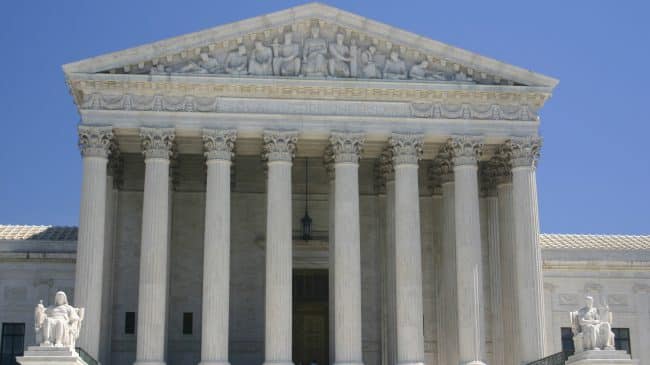Nos. 18-1451 and 18-1477
In the Supreme Court of the United States
National Review, Inc., Petitioner,
V.
Michael E. Mann, Respondent.
Competitive Enterprise Institute and Rand Simberg, Petitioners,
V.
Michael E. Mann, Respondent.
On Petitions For Writs of Certiorari to the District of Columbia Court of Appeals
Brief of Cato Institute, Reason Foundation, and the Individual Rights Foundation as Amici Curiae In Support of Petitioners
Is it defamation to call O.J. Simpson a murderer? Or, more specifically, is it defamation to call O.J. Simpson a murderer because he was acquitted in a court of law? If a blogger or commentator looked into the facts of the case and decided that, in his opinion, Simpson was, in fact, a murderer, how much weight should Simpson’s acquittal be given in a defamation suit—i.e. that the blogger’s opinion was a provably false statement of fact, that the Simpson’s jury’s acquittal was sufficient evidence of that, and that a jury could thus conclude it was defamation?
This case is little different than that hypothetical. A writer voiced his opinion on an embattled scientist’s work and included over a dozen hyperlinks showing the evidence for his conclusions. But his conclusions were at odds with “official” commissions, and the court below gave those commissions undue weight: “The assertion that the CRU emails showed or revealed that Dr. Mann engaged in deception and academic and scientific misconduct is not simply a matter of opinion: not only is it capable of being proved true or false, but the evidence of record is that it actually has been proved to be false by four separate investigations.” Competitive Enter. Inst. v. Mann, 150 A.3d 1213, 1245 (D.C. 2016) (emphasis added).
That is now the law in the District of Columbia, the pulsing heart of our political discourse. Those who arrive at conclusions contrary to official reports or investigations are too easily subject to possible defamation suits. Do you disagree with the recent Mueller report and believe that someone in the recent election did in fact fraudulently collude with a foreign government? Better lawyer up before you write an article citing the evidence for your conclusion. Or maybe you believe that the Warren Commission’s investigation into the Kennedy assassination improperly exonerated a suspect. Better lawyer up before you publish anything.
This case sits in that oft-explored space between protected and unprotected speech. It can be some- times difficult to determine the precise line between First Amendment-protected speech and fighting words (Chaplinsky v. New Hampshire, 315 U.S. 568 (1942)), incitement (Brandenburg v. Ohio, 395 U.S. 444 (1969)), obscenity (Roth v. United States, 354 U.S. 476 (1957)), and defamation (Milkovich v. Lo- rain Journal Co., 497 U.S. 1 (1990)), but this Court has “regularly conducted an independent review of the record both to be sure that the speech in question actually falls within the unprotected category and to confine the perimeters of any unprotected category within acceptably narrow limits in an effort to ensure that protected expression will not be inhibited.” (Bose Corp. v. Consumers Union, 466 U.S. 485, 505 (1984)). Here, the lower court did not adequately confine defamation to “acceptably narrow limits” in a case concerning an ongoing debate over a contentious political and scientific question.
The First Amendment reflects “a profound national commitment to the principle that debate on public issues should be uninhibited, robust, and wide-open.” N.Y. Times Co. v. Sullivan, 376 U.S. 254, 270 (1964). “[A] principal ‘function of free speech under our system of government is to invite dispute. It may indeed best serve its high purpose when it induces a condition of unrest, creates dissatisfaction with conditions as they are, or even stirs people to anger.’” Texas v. Johnson, 491 U.S. 397, 408–09 (1989) (quoting Terminiello v. Chicago, 337 U.S. 1, 4 (1949)).
The decision by the D.C. Court of Appeals threatens these principles. Defendant Rand Simberg engaged in a classic example of speech concerning public affairs: He criticized a high-profile academic (Dr. Michael Mann) whose work has been subject to intense criticism for suspected dishonesty. He lambasted various “investigations” by public and private bodies into those charges of academic dishonesty as inadequate, and he called for more investigation.
The court of appeals gave substantial, almost dispositive weight to investigations that were performed by “credentialed,” “professional” persons and academics that had seemingly exonerated Dr. Mann to varying degrees. The court then concluded that calling for an “independent investigation” demonstrated that there were facts to be found and that a jury should, therefore, be tasked with wading through a contentious public debate to assess who, in fact, was correct. This holding gave insufficient concern for the First Amendment’s protection of public debate and gave disproportionate significance to a thoroughly anodyne call for further investigation. Critiquing government investigations as inadequate—and calling for “independent” investigation of people engaged in high-stakes policy disputes—are ubiquitous in the current marketplace of political speech.
For good measure, the court radically expanded libel exposure by also concluding that defendants could face liability for using common pejoratives such as “deception” and “misconduct,” and for comparing Dr. Mann to “notorious” figures. These rhetorical devices are utterly commonplace and do not, in any event, constitute false statements of objective facts.
If this were the law anywhere in the country, it would represent a profound danger to free speech and debate. That this is the law in the District of Columbia is even worse. If allowed to stand, the decision will drastically curtail the free flow of critical speech from all directions.
